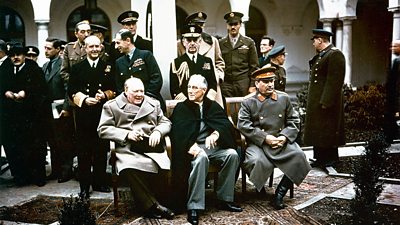Image above: Yalta Conference, February 1945. Image courtesy of National Museum of the U.S. Navy.
The hard-won peace of 1945 brought an end to six years of World War. Yet, the unresolved political, social and ideological tensions of that conflict prepared the ground for what became known as the Cold War. And it was during this extended confrontation between 1939 and 1991 that the multilingual services of the ����ý shaped their journalistic and geopolitical significance as sources of information and influence.
Transmitting in over forty languages at the end of the Second World War the ����ý was “the dominating force in international broadcasting”, as Ian Jacob put it. But what was to be the purpose of its services over the Iron Curtain? This question was answered in a Directive by Jacob on the aims of broadcasting to Europe, written after his arrival at the ����ý as Controller of European Services in 1946.
Broadcasting in the “national interest” depended on listeners trusting the ����ý to tell the truth. This itself was a lesson learnt from the experience of the Second World War and became a touchstone of editorial policy as Maurice Latey, who had joined the wartime German Service, explained.
We realised at a very early stage, not only was truth the best propaganda, but also that we had no alternative but to tell it because clearly we hadn’t got any great successes to report at that time. And though we were constantly reporting defeat our only hope was to build up a fund of credibility.
Understanding the importance of this proved critical to the exercise of broadcasting abroad during the Cold War. It also became part of the journalistic ethos of Bush House, the home of ����ý overseas broadcasting from 1942, as Oliver Whitley described in an interview for the ����ý Oral History Collection in 1977.
"The External Services operate in a world in which the free communication of accurate news and information by governments to their own people is extremely patchy … As long as that situation obtains, there will be millions of people of all colours, creeds and nationalities all over the world who know enough to know that they are not being told the truth by their own governments and who are eager enough … to listen to the source that they believe gives them the best service of information. And that source undoubtedly has been since 1939 the ����ý."
This view was echoed by Elisabeth Robson-Elliot, the former Head of the ����ý Russian Service. Speaking in 2019, she recalled that staff broadcasting over the Iron Curtain were “fighting for freedom of information” as much as anything else.
But did this make the ����ý a “Cold War” broadcaster? It was an argument repeatedly made by the Soviet Union in its criticism of programmes to Central and Eastern Europe. And it was certainly true that in its broadcasts the ����ý challenged both the ideology and the interpretation of events espoused by those countries.
However, for the former Managing Director of External Broadcasting, Gerard Mansell, this was an idea he stubbornly resisted. Not least because the ����ý, he argued, would be much more likely to win the information war, if it were not seen to be fighting it.
His predecessor, Ian Jacob had been of a similar mind a generation earlier when the Cold War was just becoming a reality. In the face of a growing barrage of Soviet propaganda targeted at the West, he cautioned against directly responding.
"Well, my attitude to that was quite simple, that if you hit back, then your policy is being dictated by Moscow because they do something and then you have to refute it. And we must at all times keep the initiative ourselves so that we decide what to deal with."
It was a view not always fully appreciated by the British government and the Foreign Office, which funded the ����ý External Services through a Grant-in-Aid. Indeed, as Mansell recalls in this interview from the ����ý Oral History Collection, there was often a failure to understanding the “public diplomacy” strengths of ����ý overseas output.
The influence of ����ý broadcasts and their credibility with audiences rested on accurate reporting and the delivery of up-to-date information, whether favourable to the ����ý and Britain, or not. Formed from the experience of the Second World War, these principles shaped the journalistic ethos of Bush House. For Peter Udell, a former Controller of European Services, it permeated the editorial approach of the ����ý during the Cold War.
Written by Dr. Alban Webb, University of Sussex.

